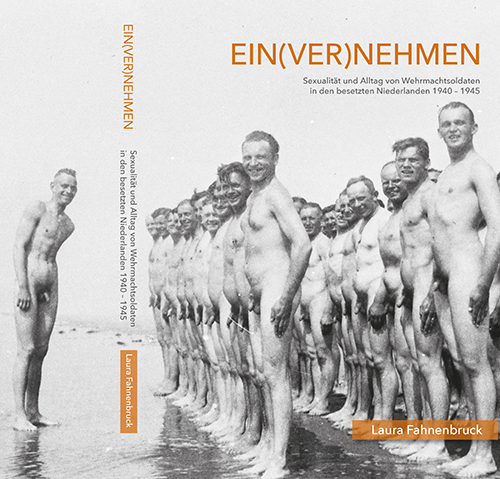De sexappeal van de Wehrmacht-soldaat
Ze introduceerden nieuwe seksuele omgangsvormen, waren lichamelijk zelfbewust en hadden een positief beeld van de Nederlandse vrouw. De Duitse soldaten die van 1940 tot 1945 de Duitse bezetting uitvoerden, vonden in Nederland liefde, avontuurtjes of gewoon seks. Historica Laura Fahnenbruck onderzocht acht jaar de alledaagse seksualiteit van de Wehrmacht-soldaat in de bezettingsjaren. En daarmee ook die van de Nederlandse vrouw in oorlogstijd. Fahnenbruck promoveert 12 november aan de Rijksuniversiteit Groningen.
Het Duitse opperbevel had een positieve grondhouding ten opzichte van contacten van Duitse soldaten met Nederlandse vrouwen. Nederland gold als een min of meer Germaans gebied en er was de bezettingsautoriteiten veel aan gelegen om te bewijzen dat de bezetting een vriendelijke noodzaak was. Contacten tussen soldaten en Nederlandse vrouwen werd hogelijk gewaardeerd uit propagandistische overwegingen. Voor soldaten was dit handig. Ze konden thuis laten zien hoe goed ze het in Nederland hadden en het bood een kans om aan het juiste mannelijke imago van de soldaat te voldoen.
Verstoord gezag
Vaak ging het verder dan samen op de foto gaan. De Duitse soldaat onttrok zich aan het traditionele gezag in de Nederlandse samenlevingen en was interessant voor jonge vrouwen. Fahnenbruck: ‘Dat zag je meteen in de meidagen van 1940. Dan komen er al berichten van meisjes die zich niks meer aantrekken van sociaal gezag. Ze hadden een nieuwe sterke partij gevonden en dat contact bood voordelen.’ Al werd het breed afgekeurd, soldaten boden concrete kansen op seksuele ervaringen.
Sexappeal
De Wehrmacht-soldaat was goed opgeleid, lichamelijk zelfbewust, had medische zorg achter de hand en beschikte over gratis condooms. De soldaten droegen indirect bij aan een modernisering van de seksuele beleving in Nederland. De Duitse soldaat had sexappeal en dat werkte. ‘De Nederlandse politie rapporteerde bijvoorbeeld een toename van ontmoetingen in portieken, waar soldaten en vrouwen elkaar konden treffen.’ Dit effect was overigens niet onbedoeld. De Wehrmacht-uniformen waren ontworpen om masculiniteit te benadrukken.
Seksualiteit en oorlog
De Wehrmacht benaderde de seksualiteit van soldaten pragmatisch. In de eerste plaats was het belangrijk dat soldaten gezond bleven, zowel voor hun echtgenotes en nageslacht thuis als voor de gevechtskracht van het leger. Het gevolg was een nuchtere medicalisering van de seksualiteit, met grote nadruk op hygiënevoorschriften en het bestrijden van de verspreiding van geslachtsziektes. De Wehrmacht, kortom, onttoverde seks.
Bordelen
Militaire bordelen ontstonden waar de bestaande medische infrastructuur haperde. Bijvoorbeeld buiten de grote steden in de nabijheid van kazernes, zoals bij de marinebasis op Hoek van Holland. Nederlandse vrouwen gingen er veelvuldig heen vanuit Rotterdam en Den Haag per trein en het was moeilijk toezicht houden op de verspreiding van geslachtsziekten. Een Duitse legerarts pleitte daarom in 1942, vergeefs overigens, voor de vestiging van een bordeel met zeker 120 vrouwen.

Het Duitse debat
De bevindingen van het onderzoek van Fahnenbruck zijn interessant voor zowel het Nederlandse als het Duitse debat over het oorlogsverleden. De casus Nederland biedt een kans om de Wehrmacht-soldaat als individu binnen de ‘Volksgemeinschaft’ te bestuderen. De Duitse soldaat zocht buiten acute gevechtssituaties naar andere manieren om een bijdrage aan de oorlogsinspanning te leveren, bijvoorbeeld door stadswandelingen te organiseren of reisgidsen over Nederland te schrijven.
Het Nederlandse debat
In Nederland domineerde ‘collaboratie’ langdurig de beeldvorming. Later nam het feminisme het op voor de Nederlandse vrouwen. Verliefdheid in oorlogstijd was immers ook gewoon verliefdheid. Fahnenbruck betwijfelt dat laatste. Vaak is onderschat dat Nederlandse vrouwen daadwerkelijke onderhandelingsruimte hadden in hun contacten met Duitse soldaten en ook in staat bleken om die ruimte gebruiken. Het collaboratieperspectief blijft juist belangrijk, want relaties met soldaten waren bijna altijd in het politieke voordeel van de bezettingsautoriteiten.
Alltagsgeschichte
Fahnenbruck onderzocht archieven van het Duitse leger en de Nederlandse politie, alsmede rechtbankverslagen. Ook gebruikte ze dagboekverslagen, brieven, foto’s en contactadvertenties. Haar academische interesse gaat uit naar de geschiedenis van het dagelijks leven.
Meer informatie
- Laura Fahnenbruck
- Fahnenbruck (Uelzen, 1979) studeerde Duitslandstudies in Groningen en werkt nu als docent aan de RUG. Op donderdag 12 november 2015 verdedigt ze haar proefschrift Ein(ver)nehmen. Sexualität und Alltag von Wehrmachtsoldaten in den besetzten Niederlanden 1940-1945. Promotores zijn prof.dr. Mineke Bosch en prof.dr. Raingard Esser.
Meer nieuws
-
19 januari 2026
Digitalisering drijft kansarme burgers soms in het nauw
-
13 januari 2026
Het goede doen in complexe situaties
